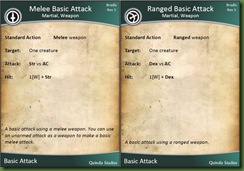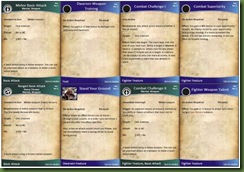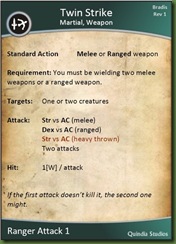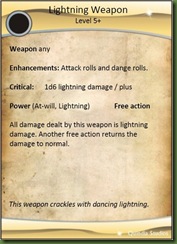Dungeons & Dragons 4th Ed.--the V-8 edition
With V-8 I refer to the vegetable drink, V-8, and the company's advertizing campaign where people slap their forehead, implying why didn't I think of that before. The reason for the reference is the basis for my comments below.
D&D has been ruined
The contention is that Dungeons & Dragons has been gutted and ruined with the 4th Edition (D&D4E). If you read the various role-playing game (RPG) forums, some people are in a state of near hysteria. It has been repeatedly said that D&D4E is now more a boardgame than any kind of RPG. They claim that Wizards of the Coast (Wotc), D&D's publisher, is cowtowing to the lucrative collectible card game and miniatures combat game markets.
It seems to me that a lot of comments are not based on fact and experience, rather snippets of information, rumour, and conjecture. I say that because now that I have read the core rulebooks from page (i) to the last page, and am well into preparing my first D&D4E campaign, a lot of what I have read does not jibe with reality.
It is blindingly clear to me that WotC had specific design and marketing goals in mind for the fourth edition. The main design goal was to make the game more approachable. I select that word purposely because it is a word I have now come across several times in positive comments, and I agree wholeheartedly with its usage. D&D4E is more approachable. With editions 3.0 and 3.5 (3.x) I felt that I had before me huge tomes of disparate rules and details that needed to be mastered. It is what put me off of RPGing. I just didn't want to get a bachelor's degree in D&D and I was forever in a mild haze of confusion as to what rules, abilities, and effects applied at any one moment. With D&D4E this has all changed.
What we have in D&D4E is a coherent and consistent system. Going through it is painless, though not effortless. That is, it all makes perfect sense without having to rely on axiomatic rules. It is not effortless in the sense that it is still several hundred pages of rules and content--Carcassonne it is not. I mention that to cover all bases but really it is unfair to compare D&D4E except to other game systems of equal grandeur.
A coherent system of powers
The issue of gutting D&D and the coherence of this new system are intertwined. The first big thing with D&D4E is the "new" idea of Powers. Just about everything is reduced to a power. Or rather, I should say fits as a power. This is, in my opinion, the key brilliant move with D&D4E. Instead of a long list of seemingly exceptions and special rules that was D&D1 (AD&D) to D&D3.x, a player now has a set of powers before them. Each power is a discrete unit of gaming with a common set of rules. If you know how to use one power then you know how to use any power. (To be fair, there still is some confusion about certain powers, but this has to do with editing, in that the language was somewhat vague and leads to more than one interpretation.)
Even basic combat fits into this system of powers. There are two generic powers called "Melee Basic Attack" and "Ranged Basic Attack". With these two powers you cover all basic hack'n'slash combat.
Basic attacks
The detail of D&D is certainly still there. There are still features of races, features of classes, feats, spells, and special abilities. But look at how all this looks organized into powers.
Some of a tiefling wizard's powers
Some of a dwarven fighter's powers
Now, the D&D4E core rules only mention cards en passant. But, naturally, a whole fan-based powers cards market has erupted. I say naturally because the discreteness of powers lends itself so obviously to cards. And, this is where the claim is made that WotC is trying to snag the collectible card players. First off, so what?! WotC is a business. Any business that doesn't adapt to its market is doomed; this is Business Management 101. I can't begrudge that thinking even if I knew it to be true. But, more importantly to me is, so what, again. Gaming evolves. Are boardgames today the same as they have always been. New mechanics have been developed over time, each one improving gaming in general, and each new game drawing upon this expanding toolbox of game mechanics.
The cards make playing D&D4E so much easier. And, that is the crux of the matter and at the heart of WotC's design and marketing strategies. The game is supposed to be about role-playing and having fun, not about rulesmanship. If one can get a great gaming experience with a lot less headaches, well duh!
Tied to powers is the notion that D&D4E has been gutted. Nothing could be further from the truth. Things have been optimized. In computer geekiology, they have been normalized. Take for example, a wizard. Firstly, "power" is a generic rules term. Each class' powers is given a contextual name, so that, for example, the wizard's powers are called spells, a fighter and ranger's powers are called exploits, and a cleric's powers are called prayers. Secondly, the more complex spells of before have been reclassified as rituals. Indeed, any class can now execute rituals so long as you learn how to.
I did a little actual fact-checking. Taking in mind font size, I added up the total number of spells and rituals available to a Wizard and compared them to the spells section of the D&D3.5 Player's Handbook (PHB). There are fewer D&D4E spells but not by much by a long shot.
This I did not find surprising at all, as WotC did in fact trim away the fat. But that is not the same as gutting. In fact, this is by design and part of the overall strategy. WotC trimmed off those bits that add complexity but don't necessarily add to the enjoyment of the game. Here is a perfect example. In D&D3,x there was a whole set of rules for fighting with two weapons. That doesn't exist in D&D4E. Very simply, you can hold two weapons but you can attack with just the one, you choose--that's it. Or, is it? Lo and behold, the Ranger has available to him a power called "Twin Strike". What does it let you do; make two attacks if you are holding two weapons.
A ranger's Twin Strike power
The effect is that the rules are simplified without sacrificing much if anything. I think another excellent illustrative example is movement in combat. It used to be that there were special rules attached to moving diagonally across a sqaure because the diagonal of a square is longer than its sides. They just dropped that outright. Moving 1 square means moving 1 square up, down, side-to-side, or diagonally. Is it less realistic? Yes, but who cares, really. Is that kind of simulative accuracy necessary for a great story-telling adventure?!
Yet another example is the concept of "an encounter". Certain powers can be used "at-will", others can be used only once per encounter, and thirdly others can be used just once per day. How long is an encounter? Five minutes, ten? Who cares, really. With this notion of an encounter as a discrete element of an adventure, out the window goes time tracking! And, who really tracked time that discretely anyway. If anything this just cleans things up.
This normalization of the system and the notion of gutting is very evident when it comes to magical items. When before there were long lists of magical items and their descriptions, items now look like:
A generic lightning magical weapon
This is not actually a role-playing item. One would use this information as the basis for your Mauradin's Sword of Doom, a magical bastard sword you found while adventuring. Or, equally it could be the basis for 'Ack's Vengeance, a favoured magical dagger. The role-playing flavour is whatever someone can come up with. It might look like there are far fewer magical items, for example, but this one item above can form the basis for hundreds of actual magical weapons of that type. So, although the D&D4E might look thinner than its predecessors, it is actually much more expansive and easily so.
Another gripe related to the supposed gutting of D&D4E is that certain elements have been dropped outright; for example, the Druid and Monk classes. They have not been dropped. There will be a Player's Handbook II coming out that will add more options for those who seek them. But, what is key is that the PHB as it stands is simpler for those who don't want to be bothered with all the minutiae. It makes the system more approachable while allowing you to add on whatever level of detail you want.
D&D4E the Boardgame
So, why do I call this the V-8 edition? Because there is absolutely nothing in D&D3.x or any version prior to that that prevented players from making cards. It's just nobody actually thoght of it really. That's not a failing. Rather, new ideas come up, like collectible card games, and there you have it.
But what about the emphasis on dungeon tiles and miniatures in D&D4E. By D&D3.x the game rules said that they're assuming the use of miniatures. In D&D4E they say, you have to use miniatures, period. Now, is that a law of nature; no, of course not. If you want to play D&D4E entirely in your head, there's nothing stopping you. But, one of the great pieces of gaming bullshit is that bit, we always played without miniatures, playing in our head, and just as well,
Yes, I used to do that too. But it's not accurate. What we played was, our party enters some vast room and fights some party of monsters and we each took turns at an attack. Whoever was left standing was the winner. If you had a good DM he might have added some colour commentary such that so-and-so character jumped off against a wall and coming down cleaved an orc in half. It was basically a black box of attack rolls counting off hit points.
But with the detailed miniatures combat system of D&D4E (which is very similar to D&D3.x) you have actual combat encounters, with tactics, special moves, and characters running in and out of rooms. Now a combat encounter is an actual role-playing adventure element, a scene. I defy someone to run a complex encounter like that in your head.
So, although there is a game board in the form of dungeon tiles and miniatures, which are classic boardgaming elements, it does not turn D&D into a boardgame. That is, unless you do. Nothing I have said and nothing in the rulebooks excludes role-playing. The fact that there is a mature combat system doesn't impact on your role-playing, it never has. But, that's up to you. It's up to the players and the DM to make a story. If you go from one combat encounter to the next playing exclusively with the combat system, then yes, you have turned D&D into a boardgame. And, if that's the case you ought to look at the D&D Miniatures game which is precisely a boardgame and designed as such.
The main reason for the D&D is a boardgame, now criticism is that toward the very end of the Dungeon Master's Guide (DMG), there are a couple of pages of instructions on how to play that type of a game without a DM. That little subsection concerns itself with random encounters and random monsters. The genesis of that section is only due to the fact that D&D4E does have such a mature combat system. WotC is just saying as an afterthought that if you wanted to, you could play that way.
But, I think, the most telling evidence that D&D4E is really a role-playing game is the DMG. All of the game playing mechanics have been consolidated in the Player's Handbook (PHB). If you wanted to just play boardgaming combat encounters all you need is the PHB. The DMG is now almost completely devoid of game rules per se. The whole book concerns itself with role-playing and running an effective and enjoyable adventure. It has sections on encounter design, quests, adventure design, campaign design, world design, and how to run a role-playing game.
RPGing again
I haven't RPGed in a long while because I just found it too much of a mental burden. D&D4E has reinvigorated my RPGness. It makes RPGing painlessly fun.
By Isaac Citrom
#
Excellent post.
The Whole Point of a New Version
I too have had the same reaction to 4E. I grew up learning D&D1E (AD&D) and played most under the D&D2E rules. I dabbled in D&D3.xE. 4E is to 3.xE as 2E was to 1E. Each new edition is criticized for updating the game. Well duh! that's what a new edition is suppose to do!
Responding to Reality
When we played 2E we introduced miniatures and a detailed house rules combat system. A year later along comes the 'official' miniatures rules. I created and used cards for both spells and psionic abilities and... lo and behold! 4E introduces cards as a basic assumption/premise. I mention this not to toot my own horn about being ahead of the game ![]() but to point out that WotC is clearly advancing the game with what its players have already done.
but to point out that WotC is clearly advancing the game with what its players have already done.
Innovation is Good
There have been a lot of innovations in RPGing in the past years and many core mechanic concepts have been developed. It would be a shame if 4E didn't attempt to bring some of its own new ideas or borrow from the best ideas out there.
What's the Problem Here?
I find it odd to hear the mainstream RPGers complain about the new edition while many of the first adopters of the original game are now revitalized and returning to look after a long absence. Seems to me that WotC nailed it. The current diehards still bought the latest edition and the market has increased with new (old) blood.
Makes me wonder what the RPGers think when they see the boardgamers lambasting the latest board game. Do they ask "why do those guys hate the new stuff? Do they really want the game to be just another version of Monopoly? Why is everything compared to Puerto Rico anyways?"
#
This post is right on.
I find the new system, especially the new combat system, makes it more of a roleplaying experience, because it's so easy to use that I can focus on imagining the situation in realistic terms instead of getting bogged down in tactical minutiae.
The only thing that concerns me still a little bit is the skill challenge system. I can see how it structures things a little better, but saying you need 3 successes before 2 failures or whatever in order to talk someone into helping you just doesn't make sense to me.
Where did you get those cards? Cards like those are something I had thought of for spells in 3.x, but 4.0 does make them seem extremely useful, and those you post here look great.
#






0 comments:
Post a Comment